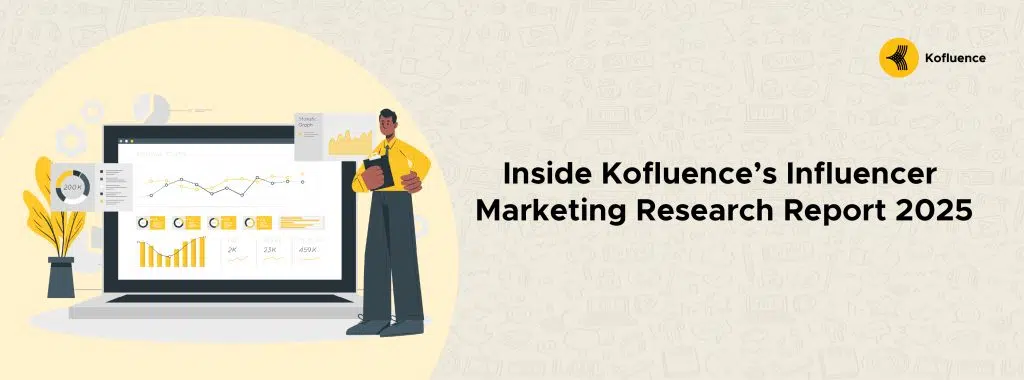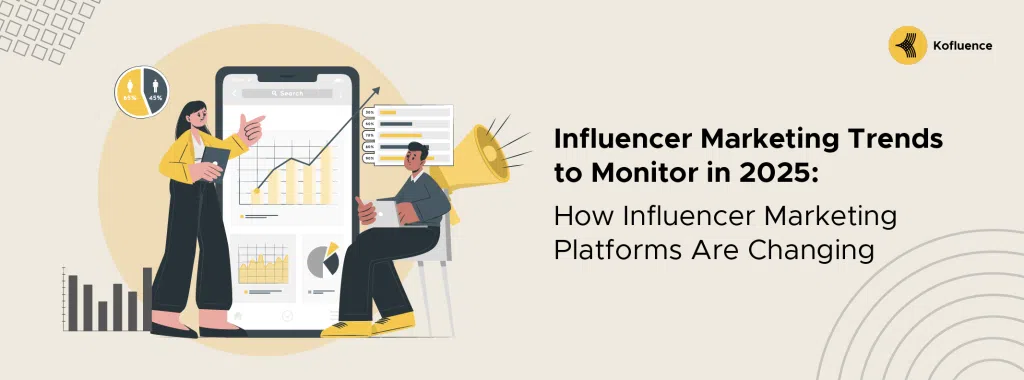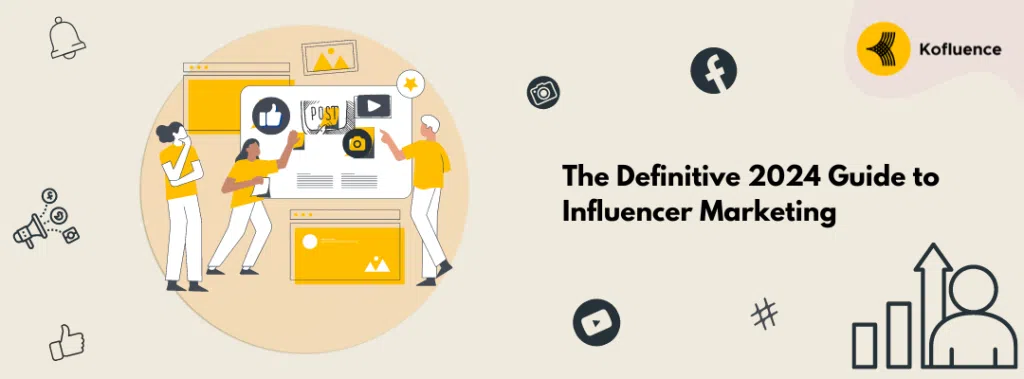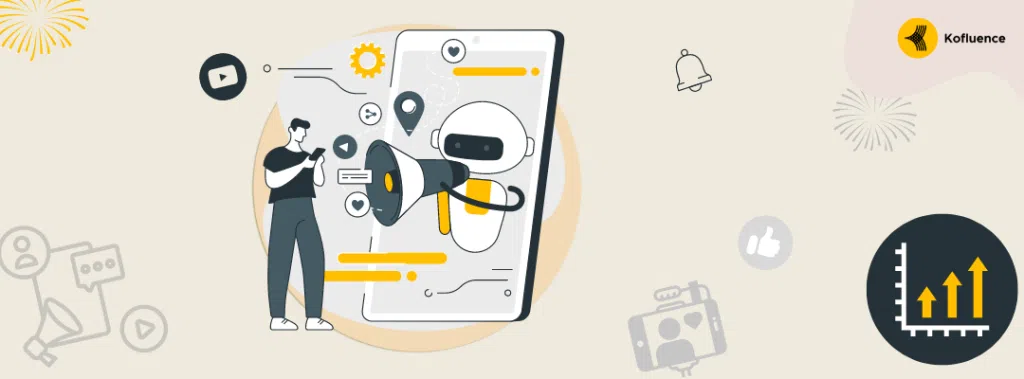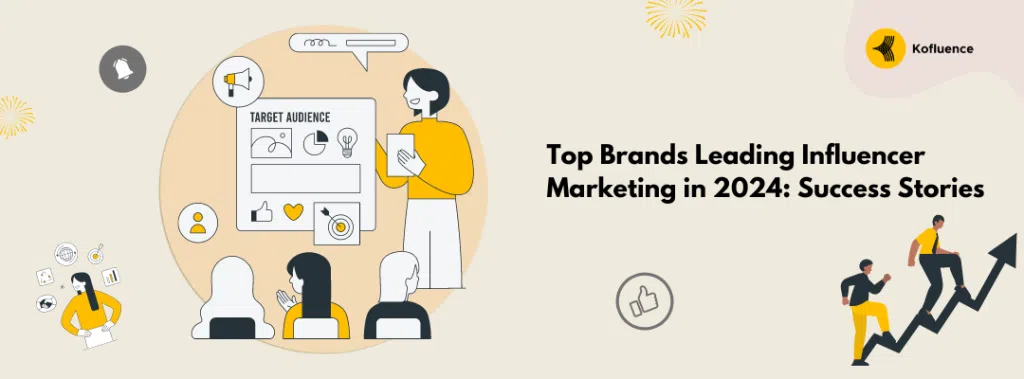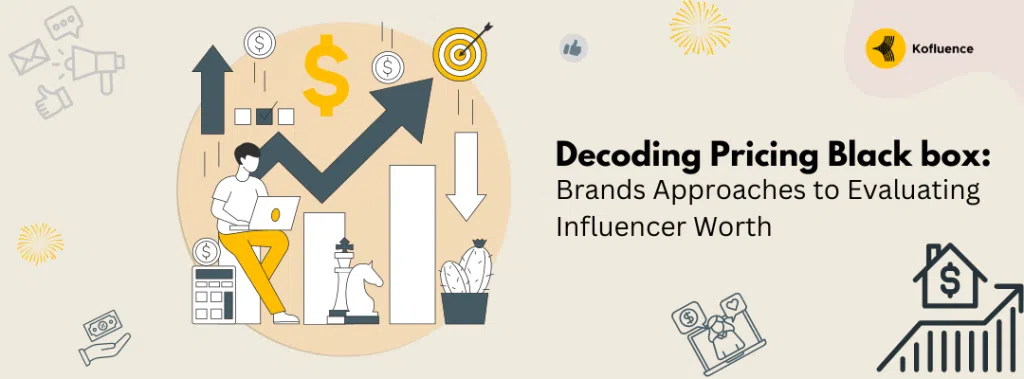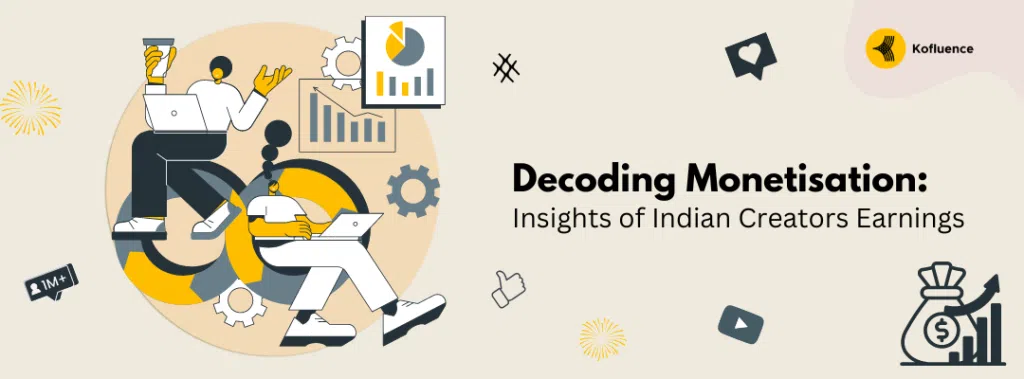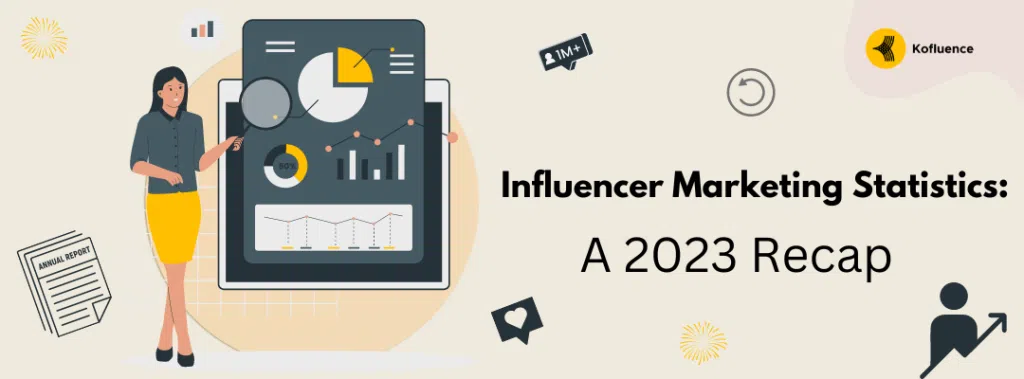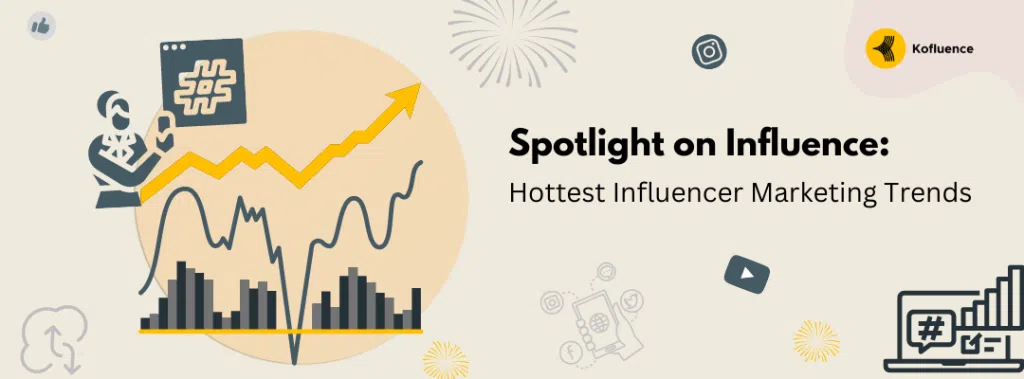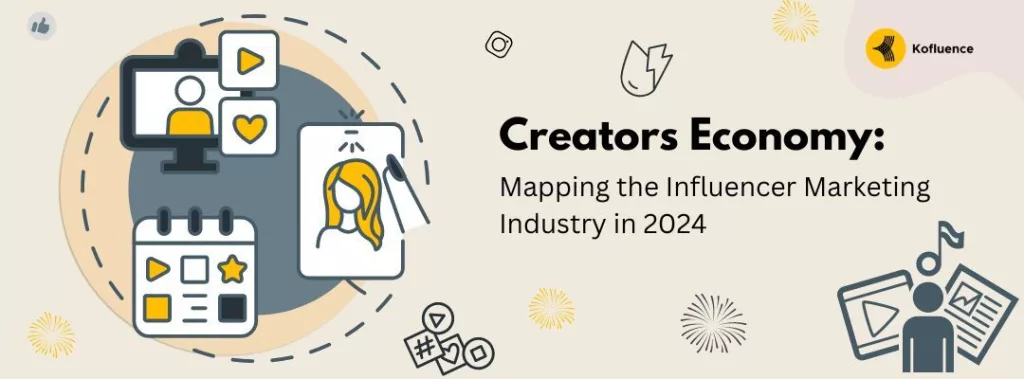Listen to Audio Blog
Table of contents:
Understanding Influencer Marketing
What is Influencer Marketing Platform?
How do Influencer Marketing Platforms Connect Brands with Influencers?
Evaluating Influencer Performance
Common Challenges in Influencer Marketing Platforms and the Solution with Kofluence
Introduction
The world of influencer marketing is in constant flux, and comprehending its intricacies can feel overwhelming. However, to harness its full potential, it is crucial to stay updated on the latest trends and form alliances with the right partners. Marketers must grasp the challenges and possibilities that influencer marketing presents in order to make well-informed strategic choices.
The effectiveness of influencer marketing campaigns is gauged by ROI, which, in turn, hinges on the impact influencers have on a brand’s key performance indicators. To enhance ROI, brands must consistently evaluate their influencers’ performance. This entails identifying pertinent metrics for measuring performance and adopting an analytics-driven approach to influencer selection, monitoring, and assessment.
Leveraging data and analytics plays a pivotal role in optimizing ROI and guiding influencer marketing decisions. Marketers need to tap into a range of data sources, such as social media platforms, website analytics, and tracking tools, to effectively measure influencer performance. Let’s dive into the blog and discuss in detail influencer marketing platforms, how they connect brands and influencers and what are the metrics they use to evaluate performance.
Understanding Influencer Marketing
In today’s marketing landscape, influencer marketing has emerged as a pivotal component of brand strategies. Collaborating with social media personalities who boast a substantial following, brands tap into their influence to endorse products or services to a receptive audience. Understanding the essence of influencer marketing is crucial, as it unveils the potential and impact of this dynamic marketing tactic. The realm of influencer marketing is in constant flux, with new platforms and influencers continuously surfacing. The industry has burgeoned into a multi-billion dollar powerhouse, with brands increasingly harnessing the prowess of influencers to connect with their target audience. However, amidst the sea of influencers, discerning the right partners can be a daunting task for brands.
Enter data and analytics—the catalysts that transform the influencer marketing landscape. By harnessing the power of data, brands gain valuable insights into an influencer’s performance and the effectiveness of their partnership. Armed with this knowledge, brands can make well-informed decisions when selecting influencers to collaborate with in the future.
Data and analytics serve another critical purpose by enabling brands to measure the impact of their influencer marketing campaigns. Defining key performance indicators (KPIs) and employing metrics to gauge influencer performance allows businesses to gauge the return on investment (ROI) of their endeavors. This analytical approach empowers brands to better comprehend the value derived from their influencer collaborations.
What is Influencer Marketing Platform?
At their core, these platforms serve as vibrant ecosystems that seamlessly connect brands with an extensive network of influencers, revolutionizing the influencer marketing landscape. They act as a centralized hub, packed with a myriad of features and tools that empower brands to effortlessly discover, engage, and gauge the impact of their influencer campaigns.
One of the standout advantages of influencer marketing platforms is their mastery of data and analytics. Powered by cutting-edge algorithms and machine learning, these platforms delve deep into a treasure trove of information, encompassing audience demographics, engagement metrics, and past campaign performance. Armed with these valuable insights, brands can confidently select influencers that resonate with their target audience, ensuring their message reaches the right people.
What’s more, influencer marketing platforms lay out a rich tapestry of comprehensive analytics and reporting capabilities. Brands can monitor the pulse of their campaigns in real-time, gaining invaluable insights into key metrics like reach, impressions, engagement rates, and conversions. This data-driven approach empowers brands to accurately gauge the impact of their influencer marketing initiatives, enabling them to make informed tweaks and optimizations that maximize their return on investment.
In addition to data and analytics, these platforms offer an array of features tailored to enhance collaboration and streamline campaign management. From uncovering relevant influencers based on specific criteria to managing influencer relationships, negotiating contracts, and even tracking content approvals and publishing schedules – these platforms consolidate these processes under one virtual roof. By simplifying and centralizing these tasks, influencer marketing platforms liberate brands from the shackles of time-consuming logistics, allowing them to channel their energy into crafting compelling content and cultivating genuine partnerships.
How do Influencer Marketing Platforms Connect Brands with Influencers?
With influencer marketing gaining all the hype, connecting brands with the right influencers is a crucial step toward achieving impactful and successful campaigns. Influencer marketing platforms have emerged as the go-to solution for streamlining this process, offering a comprehensive and efficient way to bridge the gap between brands and influencers. Let’s delve into how these platforms facilitate the connection between brands and influencers, unleashing the true potential of influencer marketing.
Discovering the Right Influencers:
Influencer marketing platforms provide brands with powerful search and discovery tools. Brands can specify their target audience demographics, niche interests, engagement metrics, and other relevant parameters to find influencers that align with their campaign goals. Through advanced algorithms and data analysis, these platforms present a curated list of potential influencers who can effectively promote the brand’s message to their engaged audience.
Streamlining Communication:
Once potential influencers are identified, influencer marketing platforms facilitate seamless communication between brands and influencers. These platforms often feature built-in messaging systems, enabling brands to initiate conversations, discuss campaign details, and establish mutually beneficial partnerships. By centralizing communication within the platform, brands can efficiently manage multiple influencer relationships and ensure clear and transparent collaboration.
Negotiating Contracts and Agreements:
Influencer marketing platforms offer dedicated spaces for brands and influencers to negotiate terms, contracts, and compensation agreements. This streamlined approach eliminates the need for lengthy email threads and simplifies the process of reaching mutually agreed-upon terms. Brands can outline their campaign objectives, deliverables, timelines, and budget, while influencers can provide insights into their creative approach and pricing expectations. This efficient negotiation process saves time and effort for both parties, fostering a more productive and professional collaboration.
Tracking and Measuring Performance:
An integral aspect of influencer marketing platforms is their ability to track and measure campaign performance. These platforms provide brands with real-time analytics and reporting tools to monitor key performance indicators such as reach, engagement, and conversions. By leveraging this data, brands can gauge the effectiveness of their influencer collaborations, optimize their strategies, and ensure maximum return on investment.
Streamlining Collaboration: Simplifying Compensation, Contract Management, and Campaign Logistics in Influencer Marketing Platforms
Influencer marketing platforms have completely transformed the way brands and influencers collaborate, offering all-encompassing solutions that simplify compensation, contract management, and campaign logistics. By streamlining these vital aspects, these platforms empower brands and influencers to focus on their core strengths: creating captivating content and connecting with their target audience.
Influencer Compensation:
Transparency and efficiency are at the heart of influencer marketing platforms when it comes to handling influencer compensation. Brands can establish their budget parameters and define the compensation structure based on factors like audience reach, engagement, content format, and campaign objectives. Within the platform, influencers can review and negotiate these terms, ensuring fair and mutually agreed-upon compensation for their valuable contributions. This streamlined approach saves time and eliminates potential misunderstandings or conflicts, benefiting both parties involved.
Contract Management:
The management of contracts and legal agreements can be complex and time-consuming. However, influencer marketing platforms simplify this process by offering dedicated spaces within the platform for brands and influencers to draft, negotiate, and sign contracts. These spaces often come equipped with customizable templates and clear guidelines, ensuring compliance with legal requirements and industry standards. By centralizing contract management, brands and influencers can easily access and refer back to their agreements, effectively mitigating any potential issues that may arise during the collaboration.
Campaign Logistics:
Executing influencer campaigns involves intricate coordination between brands and influencers. Influencer marketing platforms streamline this process by providing purpose-built tools that facilitate seamless campaign management. Brands can create comprehensive campaign briefs, outlining their objectives, content guidelines, key messages, and desired timelines. Influencers can conveniently review and accept these briefs, ensuring a clear understanding of expectations. Furthermore, these platforms often offer features such as content submission, approval workflows, and scheduling tools, enabling efficient content delivery and publication. By simplifying campaign logistics, these platforms eliminate unnecessary back-and-forth communication and enhance collaboration efficiency overall.
Performance Tracking and Reporting:
Influencer marketing platforms excel in tracking campaign performance and delivering insightful analytics. Brands can monitor key metrics such as reach, engagement, click-through rates, and conversions in real time through intuitive dashboards. This data-driven approach empowers brands to assess the effectiveness of their influencer collaborations, make informed decisions based on solid data, and optimize their strategies for maximum impact. Additionally, these platforms generate comprehensive reports that can be easily shared with stakeholders, allowing brands to showcase the success and return on investment (ROI) of their influencer marketing campaigns effectively.
Evaluating Influencer Performance
Influencer marketing is becoming an increasingly important strategy for brands to connect with their target audience. However, as with any marketing campaign, it’s essential to evaluate the success of your efforts to ensure you’re getting the best return on investment (ROI).
. Defining ROI
Planning the right ROIs in influencer marketing is crucial to determining the success of your influencer marketing campaign. This metric measures the revenue generated relative to the investment made in the campaign. It’s essential to define this metric early on so that you can measure the success of your campaign accurately.
. Identify KPI
To measure the performance of your influencer marketing campaign, you need to identify the key performance indicators (KPIs) that matter to your brand. Some common KPIs include engagement rates, reach, and conversions. These metrics will help you identify which influencers are driving the most engagement and the best ROI.
. Evaluate right metrics
Once you’ve defined your KPIs, you need to identify the right metrics to evaluate influencer performance. Metrics could include the number of likes, comments, shares, or video views. These metrics help you determine which influencers are generating the most engagement and conversions.
. Leverage Data Analytics
To make the most of your influencer marketing campaign, you need to leverage data and analytics. Data plays a critical role in influencer marketing and offers insights into how your campaign is performing. By analyzing this data, you can identify which influencers are driving the best ROI and which types of content are resonating with your target audience. Sources of data in influencer marketing include social media platforms, influencer marketing platforms, website analytics, and customer relationship management (CRM) systems. Analyzing this data requires tools that can help you visualize and make sense of it all. Many influencer marketing platforms offer built-in analytics tools that can help you track your campaign’s success.
Leveraging Data and Analytics
Data and analytics are essential when it comes to influencer marketing. Without harnessing the power of data, influencer marketing efforts risk falling flat, wasting precious time, energy, and resources. The significance of data cannot be overstated, as it serves as the bedrock upon which influencer campaigns are built.
First and foremost, data enables brands to identify the ideal influencers for their campaigns. By analyzing data encompassing demographics, location, interests, and more, brands can pinpoint influencers whose values align seamlessly with their brand identity. This data-driven approach ensures a targeted and tailored influencer selection process, laying the groundwork for fruitful collaborations.
Moreover, data empowers brands to measure the performance of their influencer campaigns with precision. By tracking key engagement metrics such as likes, comments, shares, impressions, and conversions, brands can gauge the impact and effectiveness of their campaigns. This valuable feedback allows for ROI calculation and provides actionable insights to refine and optimize the campaign strategy for maximum results.
When it comes to the sources of data in influencer marketing, a plethora of options exist. Influencer marketing platforms serve as comprehensive repositories, aggregating data from various sources to offer a holistic view of influencers’ performance. Additionally, brands can tap into social media metrics to gain valuable insights into audience engagement and response. Web analytics play a crucial role as well, enabling brands to track website traffic and conversion rates to ascertain the efficacy of influencer-driven traffic.
Common Challenges in Influencer Marketing Platforms and the Solution with Kofluence
Brands and creators often encounter challenges when utilizing influencer marketing platforms. These hurdles can hinder the smooth execution of campaigns and impact the overall success of influencer collaborations. However, with a comprehensive solution like Kofluence, these challenges can be effectively overcome, enabling brands and creators to maximize their potential and achieve remarkable results.
Finding the Right Fit:
One of the primary challenges faced by brands and creators is finding the perfect match. With countless influencers available on influencer marketing platforms, identifying the right ones who align with the brand’s values, target audience, and campaign goals can be a daunting task. However, Kofluence offers a robust and intelligent influencer discovery tool that leverages advanced algorithms and data analytics. By harnessing the power of AI, Kofluence efficiently matches brands with the most suitable influencers, ensuring a seamless fit that enhances authenticity and engagement.
Authenticity and Trust:
Maintaining authenticity and trust between brands, creators, and their audiences is vital for influencer marketing success. However, in an age where influencer fraud and fake engagement are prevalent, brands need a solution that can effectively address these concerns. Kofluence tackles this challenge by employing a meticulous vetting process to verify influencers and their audience authenticity. Through thorough background checks, audience analysis, and engagement validation, Kofluence ensures that brands can collaborate with genuine and credible influencers, building trust with their target audience.
Streamlined Collaboration:
Coordinating and managing influencer campaigns can become overwhelming, especially when working with multiple influencers across various platforms. Communication, content approvals, and campaign logistics can easily become fragmented and time-consuming. Kofluence offers an intuitive and centralized platform that simplifies the collaboration process. With its seamless communication channels, content management features, and campaign tracking tools, Kofluence enables efficient coordination between brands and creators, streamlining the entire collaboration journey.
Performance Measurement and ROI:
Measuring the success and return on investment (ROI) of influencer marketing campaigns is crucial for brands. However, tracking and analyzing performance metrics across different platforms and campaigns can be challenging. Kofluence addresses this challenge by providing comprehensive analytics and reporting functionalities. Brands can gain real-time insights into key performance indicators, including reach, engagement, conversions, and more, all in one centralized dashboard. With Kofluence’s robust reporting capabilities, brands can easily evaluate the impact and ROI of their influencer marketing efforts.
Conclusion
In conclusion, In today’s highly competitive market, optimizing ROI through data and analytics in influencer marketing platforms is crucial. By defining ROI and KPIs for measuring influencer performance and leveraging data from various sources, businesses can improve influencer performance and maximize ROI. By using data and analytics appropriately, businesses can boost their overall influencer marketing strategies. To sum it up, data and analytics are the heart of modern influencer marketing, and leveraging them can provide that crucial competitive edge needed to stay ahead of the competition.
By providing intelligent influencer discovery, ensuring authenticity and trust, streamlining collaboration processes, and delivering comprehensive performance measurement and ROI tracking, Kofluence empowers brands and creators to navigate the influencer marketing landscape with ease and achieve extraordinary outcomes. Start your influencer marketing journey with Kofluence – India’s most trusted platform today!
If you found this blog to be helpful browse through our website for other blogs on similar topics or get in touch with us for your next influencer marketing campaign! Download the Kofluence app and find relevant campaigns catering to your target audience! To opt-in, download the Kofluence app here: iOS users, and Android users.

